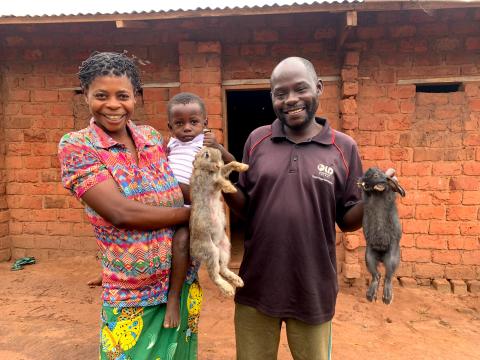At 3 Years Old, Oscar Is Saved from Malnutrition Thanks to the KOICA-Funded Project in Luiza

By Pascaline Milemba, Communications Officer
At the age of three, Oscar began to show signs of malnutrition without his parents realizing it. One day, during a voluntary community malnutrition screening, Oscar was diagnosed with acute malnutrition.
Not knowing where to turn, Stéphane, Oscar’s father, who had limited income, began to lose hope. For him, the lack of financial means meant his son might not receive treatment. Living near the roundabout in the center of Luiza territory, in the Kasaï Central province, where medical care is extremely expensive, Stéphane's last hope was divine intervention.
“I surely saw my child’s health deteriorate overnight, but I didn’t know what was happening until the community health workers came and confirmed that little Oscar was suffering from malnutrition,” Stéphane said, his voice soft and trembling.
Hope Rekindled Through Community Engagement
Continuing his testimony, this father of four shared how the advice from community health workers became a guiding light that helped him smile again.
“When I had lost all hope, the community workers advised me to go to the nearest health center. That’s when I started to slowly find my smile again,” he recalled.
At the Tutanter Health Center, located in the Rond-Point neighborhood in rural Luiza, where Stéphane took his son Oscar, everything went as planned. In addition to the quality treatment with Plumpy’Nut that Oscar received, there was also a donation of seeds, young rabbits, and farming tools. These items and livestock were provided to the father by World Vision through its malnutrition prevention project. These resources allowed Stéphane to start a small-scale farming activity, which he now maintains with great care.
A Recovery That Inspires a Whole Community
“Beyond the free treatment my child received, I was one of the beneficiaries who got two baby rabbits, agricultural seeds, and tools. Today, I have more than ten rabbits. I’ve already sold some, and that income now helps me feed my children better. We have vegetables, rabbit meat, and even some earnings from selling the animals. My son is now healthy. We can get through the month with food that comes directly from our little garden,” he said, smiling.
Having experienced this firsthand, Stéphane has become a leading advocate in his community.
“Everyone knows me in this neighborhood; I’ve become a true mobilizer. I told the parents that thanks to the project, I learned we can overcome malnutrition if we accept guidance and change some of our habits,” he shared with conviction.
To conclude, Stéphane didn’t hesitate to pay heartfelt tribute to the Korean government, the WFP, and World Vision for their precious support, which brought joy back into his life.
“I don’t have stronger words than thank you. Thank you from the bottom of my heart,” he said in closing.
Oscar is not the only child who has faced this ordeal. Over 20,000 children like him suffer from malnutrition in the Luiza territory. To address this crisis that is threatening future generations, the malnutrition prevention project funded by the Korean government through the World Food Programme (WFP) and implemented by World Vision serves as a true catalyst. This project is active in the health zones of Luiza and Luambo.
Its goal is to prevent all forms of malnutrition in children under five and pregnant and breastfeeding women through community-based screenings and the promotion of family farming and small-scale livestock rearing.
By the end of December 2025, the project aims to reach nearly 57,194 families with improved seeds, farming kits, livestock, and training on good agricultural and nutritional practices.